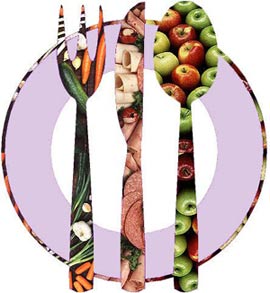WHO: Food safety is a problem for every country
The World Health Organization (WHO) calls on international opinion not to pay too much attention to China's food safety issue, but all countries need to strengthen control of this global field. .
Strengthen legislation on food safety
Facing the growing concern about China's food and drug scandals, WHO said on July 17, 2007 that China should not be seen as a special case of food safety. (Food Safety), which all countries, rich or poor, have to improve this problem by setting out better policies and regulations.

'WHO is working with all countries to strengthen food safety legislation'.(Artwork: Oznet.k-state.edu)
Dr. Margaret Chan, WHO Director-General, said the United Nations receives about 200 reports from 193 member countries monthly on cases of food poisoning.
But according to WHO, many cases of food-borne diseases have not been fully reported, in which salmonella or E. coli diseases account for a large proportion.
Ms. Chan stressed: 'I would like to say that food safety is a big problem for both developed countries and developing countries .' She said 'WHO is working with all countries to strengthen food safety legislation'.
Developing countries need to promote priorities for food safety
According to WHO, China is a country where regulations on food and pharmaceutical safety are lax. This condition has existed for many years and is the cause of scandal in recent times.
On July 13, the Chinese government ordered pharmaceutical and food companies to put food safety first and call on the media to have a more optimistic view of love. medicine and food form in this country today.
Many patients in Panama have died because cough pills contain toxic chemical ingredients from China; American pets have died because the food containing contaminated ingredients is also from China, and dangerous toothpaste from this country has been discovered in Central America and other regions of the world. gender.
However, Dr. Jorgen Schlundt, Director of WHO's Food Safety Division, said China has overcome its weaknesses since 2001 and is implementing some WHO recommendations.
Speaking to Reuters news agency, Mr. Schlundt said: 'They are acting in that direction. There has been a high level political commitment to implement some relevant measures' . He stressed that food safety is a common problem, not just of any country.

Chinese technicians are evaluating food quality in Beijing (Photo: Reuters)
He said: 'We do not see China as a special case of particular concern. The country is aware of the need to improve food safety systems. To do that, every country needs a long time, not just China. After the outbreak of mad cow disease in 1896, it took a long time for Britain to overcome it. '
He said that since 1963, the Codex Alimentarius Committee - the Joint Commission of FAO and WHO - has been established with the task of developing international standards for food safety and implementation rules to protect health. people all over the world.
According to Mr. Schlundt, every year WHO issues between 10 and 20 'urgent announcements' to warn about potential international health problems related to food.
Most of these messages relate to problems that exist in industrialized countries - those with a better system for monitoring and reporting epidemics.
He said that 'some developing countries have food safety weaknesses because they have not given priority to this field'. To illustrate, he cites the case of sub-Saharan Africa and some parts of Latin America.
Last September, the WHO warned all member countries about the outbreak of cholera caused by E. coli 0157 in spinach in the US. This epidemic has seriously affected 205 people, including 3 deaths.
Quang Thinh
- How Korea helps people eat clean
- 10 golden rules to avoid food poisoning
- Food safety action month: 14 people died from poisoning
- Steps to handle food safety
- How to buy pork without salbutamol and spinach without water
- Food experts advise you not to eat the following 6 dishes
- Food hygiene and safety: Need to be concerned immediately!
- Stun with super fast flour
- Mistakes when using MSG
- Bacteria are good for controlling germs
- It will be dangerous if you deliberately eat these foods with signs after Tet
- How does the substance in dirty noodles destroy the stomach like a letter?
 Green tea cleans teeth better than mouthwash?
Green tea cleans teeth better than mouthwash? Death kiss: This is why you should not let anyone kiss your baby's lips
Death kiss: This is why you should not let anyone kiss your baby's lips What is salmonellosis?
What is salmonellosis? Caution should be exercised when using aloe vera through eating and drinking
Caution should be exercised when using aloe vera through eating and drinking